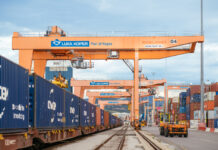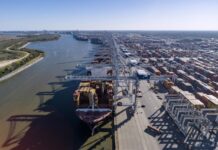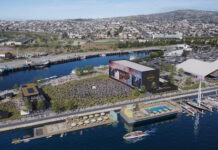
The Vancouver Fraser Port Authority, together with partners from across the port community, is testing various low- and zero-emission fuels and technologies at the Port of Vancouver, as part of efforts to phase out all port-related emissions by 2050 in support of the Government of Canada’s goal.
According to Port of Vancouver, through the Low-Emission Technology Initiative, a joint initiative between the port authority and the Province of British Columbia, the port authority and the province have each committed US$1.1 million in funding to support the port community’s transition to low-emission energy, including the testing of battery-electric-powered terminal tractors, 100% biodiesel on commercial ferries, a hydrogen-powered crane, and 100% renewable diesel on a terminal locomotive and one of the port authority’s patrol boats.
“Charting our course towards a zero-emission port starts with collaborative efforts like these—between the port authority, the port community, and government—to test innovative new low-emission fuels and technologies that reduce emissions while keeping trade moving through the Port of Vancouver,” commented Robin Silvester, president and chief executive officer of the Vancouver Fraser Port Authority.
Efforts to test low-emission fuels include a six-month trial of 100% renewable diesel on one of the port authority’s patrol boats, Takaya, making the port authority the first federal agency in Canada to run a vessel on 100% renewable diesel.
Renewable diesel is a non-fossil fuel energy source derived from a range of organic sources such as vegetable oils, animal fats and food waste. Using renewable diesel can result in up to 80% less net greenhouse gas emissions than regular diesel on a life-cycle basis. Shell Canada, a partner on this project, supplied the renewable diesel and provided technical expertise.
Across the port of Vancouver, many other low-emission fuels and technologies are being tested by members of the port community, such as Viterra, which operates two grain terminals on the south shore of Burrard Inlet, recently began a six-month trial of 100% renewable diesel on one of its locomotives at its Pacific Terminal.
Additionally, DP World, which operates four container terminals across British Columbia, recently installed five zero-emission electric rail-mounted gantry cranes at its Centerm container terminal on the south shore of Burrard Inlet and is also in the final planning stages of retrofitting a hydrogen fuel cell-powered rubber-tired gantry crane.
Last but not least, Seaspan Ferries, which operates a commercial ferry service between its terminals on Vancouver Island and the Lower Mainland, recently began running all six of its commercial ferries on 100% biodiesel, following the success of a pilot project launched last year with the support of the port authority and the province.




